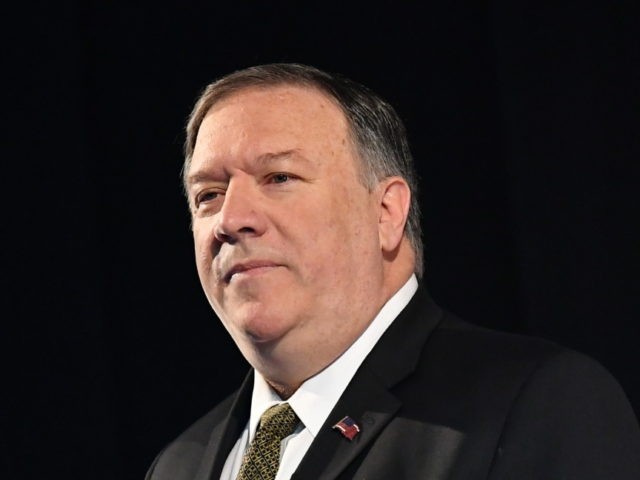Secretary of State Mike Pompeo postponed a trip to Moscow and went to Brussels instead on Monday, determined to “discuss recent threatening actions and statements by the Islamic Republic of Iran” with foreign ministers of the European Union at their regular meeting.
According to the U.S. State Department, Pompeo wanted to “coordinate closely with our allies and partners and ensure the security of our mutual interests in the Middle East and around the world.” He planned to continue on to Sochi, Russia, for meetings with Russian President Vladimir Putin and Foreign Minister Sergey Lavrov on Tuesday.
ABC News wrote on Monday that Pompeo set European leaders on edge with stern criticism last week of their unwillingness to ban Chinese telecom giant Huawei from working on their 5G wireless networks, and for not doing enough to contain the threat of Iran.
Pompeo also remarked that support for the regime of socialist dictator Nicolás Maduro in Venezuela by some European leaders is “disgusting,” a jab taken personally by British socialist and Labour Party leader Jeremy Corbyn, probably because Pompeo said it during a joint press conference with him.
Analysts who spoke to ABC News gingerly suggested the Trump administration is correct in many of its criticisms of Europe, but its blunt language has rattled and alienated Europeans accustomed to a much lighter touch from Washington:
“It isn’t necessarily that the administration is delivering a different message to that from other recent administrations on some issues (such as defense expenditure) but the tone and the public dressing downs are pretty brutal,” he told ABC News. “It does mean that the visits of major administration officials now have the feel of something to be dreaded rather than welcomed.”
Some of these criticisms are predictable and justified, according to Benjamin Rhode, research fellow for transatlantic affairs at the International Institute for Strategic Studies.
“I think the Trump administration is justified to complain about the failures of most of its European partners to pull their weight when it comes to military spending in NATO,” he told ABC News. “This has been a U.S. complaint for many decades.”
Iran is clearly one of the major points of stress between the Trump administration and Europe since most European leaders wish to preserve the Iran nuclear deal (formally known as the Joint Comprehensive Plan of Action or JCPOA) but the United States has withdrawn from it. Some European ministers have begun musing in public about the danger of a military conflict between the U.S. and Iran erupting as a result of “escalation that is unintended,” as British Foreign Secretary Jeremy Hunt put it.
Pompeo stressed during an interview on Saturday that America is not pushing for a military confrontation with Iran.
“We’re not going to miscalculate. Our aim is not war. Our aim is a change in the behavior of the Iranian leadership,” he said.
Pompeo said it was important for Iran to be aware of U.S. capabilities in the region so the Iranians do not “make a bad decision.”
“The forces that we’re putting in place, the forces that we’ve had in the region before — you know, we often have carriers in the Persian Gulf — but the president wanted to make sure that, in the event something took place, we were prepared to respond to it in an appropriate way,” he said, referring to the arrival of the aircraft carrier USS Abraham Lincoln in the region.
“An attack on American interests from an Iranian-led force, whether it’s an Iranian proper or it’s an entity that is controlled by the Iranians, we will hold the responsible party accountable. President Trump has been very clear about that: Our response will be appropriate,” he said.
State Department spokesman Brian Hook said on Monday afternoon that Pompeo shared information about the “escalating threat” of Iran with EU ministers at the meeting in Brussels.
“The secretary wanted to share some details behind what we have been saying publicly. We believe that Iran should try talks instead of threats. They have chosen poorly by focusing on threats,” said Hook.
Hook confirmed that one topic of conversation between Pompeo and the assembled EU ministers in Brussels was the apparent series of “attacks on commercial vessels” anchored near the United Arab Emirates over the weekend. The State Department did not say whether Iran was suspected of ordering or conducting the sabotage.
European Union diplomats in Brussels said they expected Pompeo to press the EU to withdraw from the JCPOA or completely renegotiate it. The Europeans have suggested they might be amenable to minor revisions, while Iran rejects all efforts to change the deal.
EU ministers said they have created legal and financial avenues for European companies to continue doing business with Iran, but they implied many of their corporate leaders are reluctant to pursue those opportunities because they fear they will be penalized by the United States.

COMMENTS
Please let us know if you're having issues with commenting.